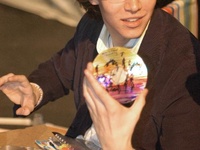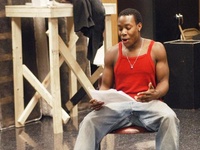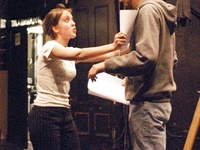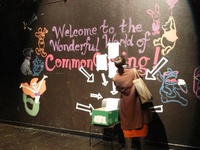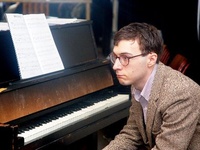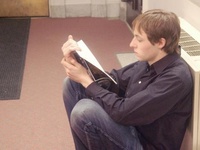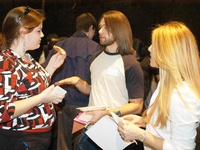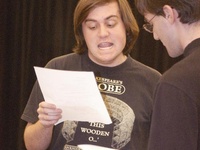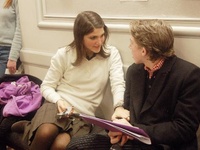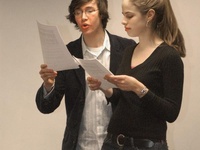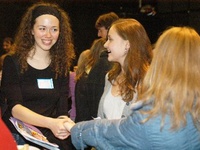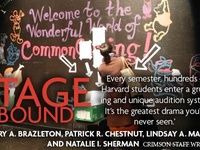From day one, the pressure is on for Hanley.
But for the relaxed and affable Spillane-Hinks, Common Casting is an affair among friends, full of laughs and hugs. She and her producers mill about the Loeb Ex with comic book-inspired flyers advertising "P.O.W.W.!" (an acronym for the play cleverly disguised as Batman-esque onomatopoeia).
Even without any immediate pressure, Spillane-Hinks maintains a strict professionalism throughout the process. By the final night of Common Casting, she manages to boil down her play’s selling points into one concise sentence: "It happens to take place 100 years ago and it happens to take place in Ireland, but it could take place in Iowa and it could take place on the stage of Jerry Springer."
COMMON CULTURE
During Common Casting week, actors wait their turn to audition from 6 p.m. until midnight. The process works with surprising efficiency; hopefuls sign up to audition for specific plays, they are called up a handful at a time and given script excerpts, or "sides," for their preliminary stab at stardom.
For returning actors, Common Casting is "really spending a week reconnecting with friends," says Walleck.
This is the fourth time through for Martin, the sixth for Walleck, and both have developed strategies to psych out the directors, waiting until the end of the week to audition so that directors have time to feel out the competition. Directors and producers have seen them—often acted with them—before, meaning that their presence at an audition registers.
"You have to get your first break and then by senior year you have better options," Walleck adds.
Martin acknowledges that the experience can be "political" and that it helps "to know people." But he praises the efficiency of the process. "I think it’s kind of the perfect way to organize the college theater process," he says. "When you’re doing it, it kind of sucks—you’re so tired and jumping around from thing to thing, trying not to piss directors off—but looking back on it, it’s really fun,"
To Shafrin, finishing the first day of auditions not only alleviates a lot of stress, but highlights the extreme difference compared to his first Common Casting week.
"You come in as a freshman, not only do you not know any people," he says, "but you don’t really know what shows are good, what shows are bad, what you should be nervous for."
Now, however, the friends and connections he has made during first semester make the process a bit easier: "If you have a horrible audition, they still know what you’re capable of."
At the same time, performing for familiar faces creates some difficulty. "It’s easier to be crazy and uninhibited in front of total strangers rather than friends," says Shafrin.
‘BOOTY-SHAKE-SHAKE-SHAKE’
Among needles, snakes, and spiders, Polk announces that he is afraid of things in between his teeth. Oh, and collared shirts. "Those really freak me out," he says.
The show is "Knock," and during auditions director Jess R. Burkle ’06 asks actors to introduce themselves by name and phobias.
At "Playboy" auditions in the ornate Horner Room of the Agassiz, Spillane-Hinks and her producers sit behind a long table, calm and serious. That’s not to say they’re all business—they aren’t afraid to laugh with actors, especially those they know.
But Executive Producer Zoe M. Savitsky ’07 gives even friends of the production team a carefully rehearsed speech, detailing the information they need for callbacks. She encourages them to visit the play’s website and join its e-mail list—another uniquely professional advertising strategy Spillane-Hinks employs.
Spillane-Hinks recognizes that, "we’re both auditioning for each other." She compares the interactions between actor and director to a choreographed routine: "The objective of the scene is to say, ‘We are responsible, we are focused, we are good people.’"









